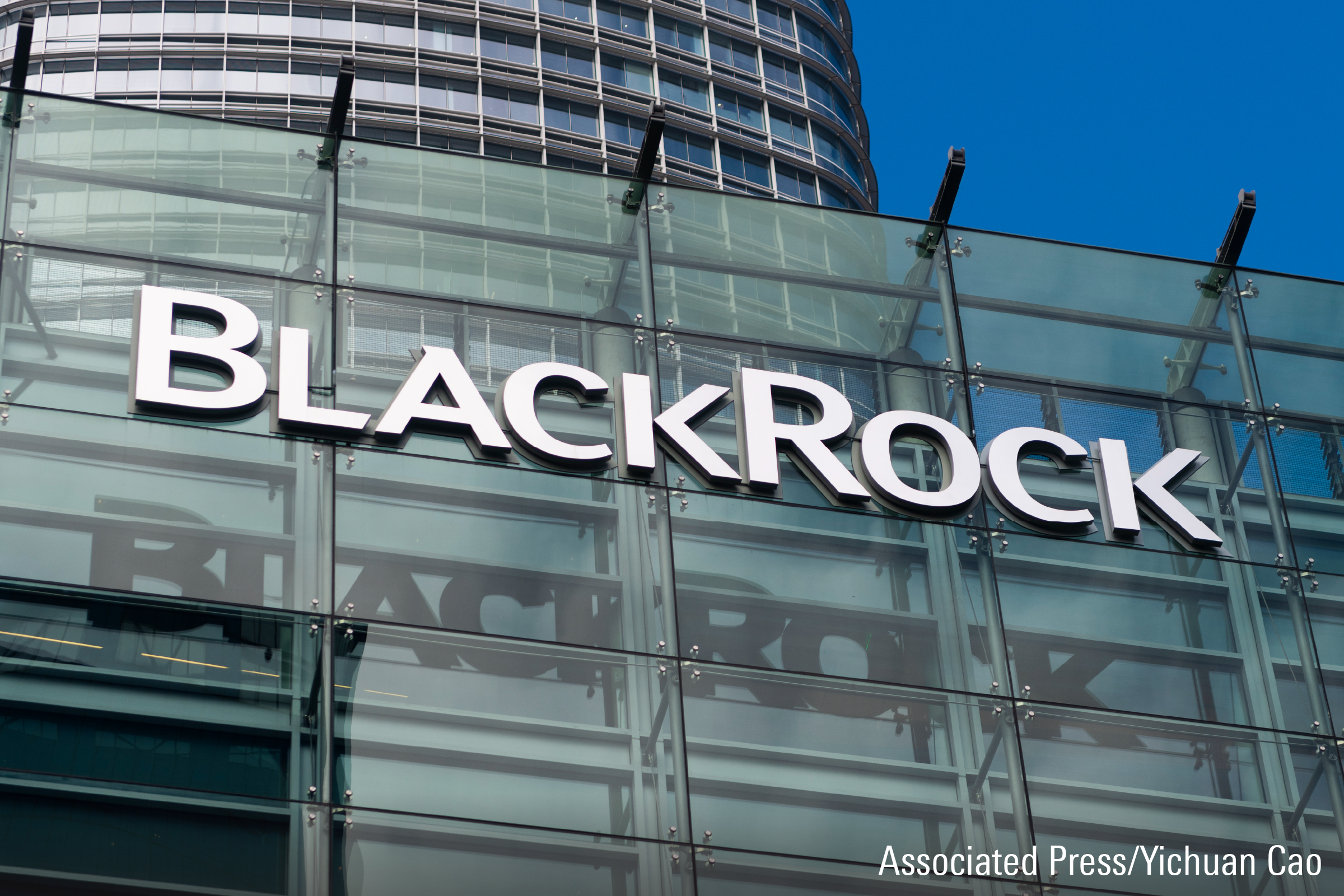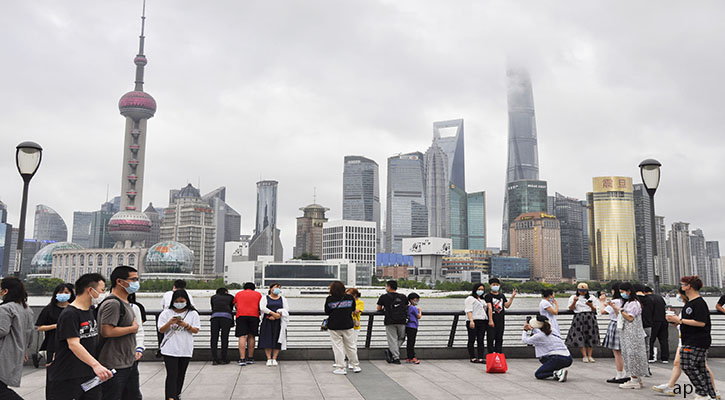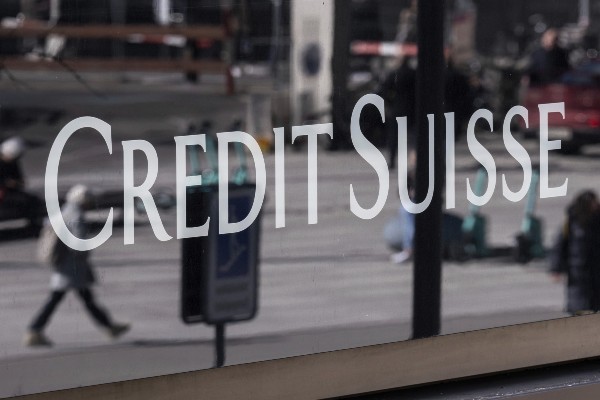
In a widely awaited annual letter to investors and corporate chieftains, BlackRock CEO Larry Fink weighed in on the outlook for banks and the global economy following the seizure of Silicon Valley Bank (SIVB), spoke to the likelihood of higher inflation, and continued to sound the call on climate risk.
More risks in banking beyond rising interest rates and the asset-liability mismatch that felled SVB may follow, including a “liquidity mismatch” after years in which investors plowed money into illiquid investments, said Fink, who runs the world’s largest asset manager. A pullback in lending is likely, as are stricter capital standards for banks.
Fink noted that the increasingly fragmented global economy, created in part by the need to source essential goods “close to home even if it means higher prices,” could keep inflation “closer to 3.5% or 4.0% in the next few years.”
Higher rates will constrain governments from running the deficits of previous decades, and this underscores the need to grow, he said. North America would be a big beneficiary of this trend, he suggested.
ESG efforts 'client driven'
BlackRock BLK, which many regard as a leader in sustainable investing, has been the target of criticism from many Republican state and federal legislators, who claim it’s pursuing a “woke” agenda. For example, in the past, Fink has spoken of the need for companies to have a “social purpose.”
This year, Fink pushed back, noting that the firm’s efforts are driven by client demand. Climate risk continues to be an investment risk, he said. Rising bills for natural catastrophes are driving up insurance rates “and will have a huge impact on homeowners, some of whose homes may simply become unaffordable to insure.”
Meanwhile, Fink said that the transition to a low-carbon economy “is top of mind for many of our clients” who are tracking the transition “just as they track any other driver of investment risk.” In a related step, BlackRock has given clients greater choice, including the ability to exercise control over their own proxy votes. That’s now used by managers of nearly half of the firm’s index equity assets.
Fink emphasized the important role of fossil fuels, particularly natural gas, in the energy transition. He also reiterated the opportunities for investors that arise from the energy transition, driven in part by the Inflation Reduction Act. Despite Fink’s emphasis that clients seeking sustainability information and approaches have driven the firm’s actions, BlackRock, as the world’s largest asset manager, exerts a great deal of influence on corporate performance and behavior.
“The very length of Fink’s letter seems designed as a response to critics illustrating that climate risk and other material sustainability risk are not BlackRock’s only focus,” says Morningstar’s Jon Hale. “That said, Fink did reiterate that these risks are investment risks and noted the importance of better data for investors to understand the influence of these risks.”
BlackRock was in excellent shape in 2022, despite well-publicized withdrawals from Republican states that oppose environmental, social, and governance approaches in investing. Even though most of BlackRock’s peers saw net outflows in 2022, BlackRock had net inflows of nearly $400 billion.
Fink also sounded off on the looming retirement crisis, noting that an economic malaise or a full-blown recession could stop savers from turning into long-term investors.
Fink usually sends two letters—one to BlackRock shareholders, and one to corporate CEOs. This year, he said, he wrote just one because so many of BlackRock’s stakeholders are facing the same issues.
Lindsey Stewart, who leads investment stewardship research at Morningstar, said Fink “is drawing a line in the sand on sustainability and saying that there are some things it simply isn’t the job of asset managers to do.” Rather, Fink “is consolidating BlackRock’s focus on investment returns for clients, while giving them the opportunity to express their own view on sustainability matters that come to vote,” Stewart said.
Adam Fleck, director of ESG equity research for Morningstar, said the letter “highlights three key points: 1) investor choice is paramount; 2) financially material risks, including ESG and all other, must be considered when making investment decisions; and 3) investment options can include all kinds of potential sectors, including oil and gas, even over the long term.”
Meanwhile, Fink’s progressive critics continue to want BlackRock to do more to address climate change. In a statement, Moira Birss, climate finance director at Amazon Watch, said, “Fink has again recognized, as any clear-eyed observer would, that climate change risk is having a material impact in the world, citing rising insurance costs due to climate change numbers. However, Fink claims that BlackRock shouldn’t engineer outcomes related to climate change. This ignores the fact that maintaining the status quo is as much a choice as taking action.”
Here are some excerpts from Fink’s letter.
SVB and the Banking Crisis
- “Today’s banking crisis will place greater importance on the role of capital markets. As banks potentially become more constrained in their lending, or as their clients awaken to these asset-liability mismatches, I anticipate they will likely turn in greater numbers to the capital markets for financing. And I imagine many corporate treasurers are thinking today about having their bank deposits swept nightly to reduce even overnight counterparty risk.”
- “There could yet be a third domino to fall. In addition to duration mismatches, we may now also see liquidity mismatches. Years of lower rates had the effect of driving some asset owners to increase their commitments to illiquid investments—trading lower liquidity for higher returns. There’s a risk now of a liquidity mismatch for these asset owners, especially those with leveraged portfolios.”
- “It does seem inevitable that some banks will now need to pull back on lending to shore up their balance sheets, and we’re likely to see stricter capital standards for banks.”
World Economy
- “[Government and corporate leaders] want to source essential goods close to home even if it means higher prices. These shifts are producing a less integrated, more fragmented global economy. Leaders in public and private sectors are essentially trading off efficiency and lower costs for resilience and national security. It is understandable public policy. But for investors it is important to recognize the risks and opportunities it creates.”
- “Governments are playing a bigger role in where products can be sourced and where capital should be allocated … This may produce better national security outcomes with more resilient and secure supply chains. But in the near term, the effects are highly inflationary. This trade-off between price and security is one of the reasons I believe inflation will persist and be more difficult for central bankers to tame over the long term. As a result, I believe inflation is more likely to stay closer to 3.5% or 4.0% in the next few years.”
- “I believe that North America could be one of the biggest global beneficiaries. We have a large and diverse labor force. We have abundant natural resources, with the potential for both energy and food security. Public policy is helping to keep chip manufacturing in the U.S., and the latest innovations in AI have become a new preoccupation. Other national winners will emerge as well.”
Climate and Energy Transition
- “Climate risk as an investment risk. That’s still the case.”
- “The U.S. housing market could see significant changes if people relocate to areas less affected by changing weather patterns. To prevent an exodus from coastal zones and areas affected by drought and wildfires, some governments have been subsidizing or replacing private insurance. Most flood insurance policies currently providing coverage in Florida are underwritten by the federal government’s National Flood Insurance Program. The NFIP has had to borrow funds from the U.S. Treasury and is currently $20.5 billion in debt.”
- “We are working with energy companies globally that are essential in meeting societies’ energy needs. To ensure the continuity of affordable energy prices during the transition, fossil fuels like natural gas, with steps taken to mitigate methane emissions, will remain important sources of energy for many years ahead. BlackRock is also investing, on behalf of our clients, in responsibly managed natural gas pipelines.”
- “We see the Inflation Reduction Act in the U.S. creating significant opportunities for investors to allocate capital to the energy transition. This legislation commits an estimated $369 billion for investment in energy security and climate change mitigation. This is attracting investment into existing and emerging technologies like carbon capture and green hydrogen. We are creating opportunities for clients to participate in infrastructure and technology projects, including the building of carbon capture storage pipelines and technology that turns waste into clean burning natural gas. European governments are also developing incentives to support the transition to a net zero economy and drive growth.”
Sustainability and ESG Risk
- “Many of our clients also want access to data to ensure that material sustainability risk factors that could impact long-term asset returns are incorporated into their investment decisions … These clients track the transition to lower carbon emissions just as they track any other driver of investment risk.”
- “It is not the role of an asset manager like BlackRock to engineer a particular outcome in the economy, and we don’t know the ultimate path and timing of the transition. Government policy, technological innovation, and consumer preferences will ultimately determine the pace and scale of decarbonization. Our job is to think through and model different scenarios to understand implications for our clients’ portfolios. That’s why BlackRock has been so vocal in recent years in advocating for disclosures and asking questions about how companies plan to navigate the energy transition.”
- “As minority shareholders, it’s not our place to be telling companies what to do. My letters to CEOs are written with a single goal: to ensure companies are going to generate durable, long-term investment returns for our clients.”
- “It is for governments to make policy and enact legislation, and not for companies, including asset managers, to be the environmental police.”












.png)









